- Home
- Nathaniel Hawthorne
Legends of the Province House Page 3
Legends of the Province House Read online
Page 3
Captain Lincoln proceeded to relate some of the strange fables and fantasies which, as it was impossible to refute them by ocular demonstration, had grown to be articles of popular belief, in reference to this old picture. One of the wildest, and at the same time the best accredited, accounts, stated it to be an original and authentic portrait of the Evil One, taken at a witch meeting near Salem; and that its strong and terrible resemblance had been confirmed by several of the confessing wizards and witches, at their trial, in open court. It was likewise affirmed that a famaliar spirit or demon abode behind the blackness of the picture, and had shown himself, at seasons of public calamity, to more than one of the royal governors. Shirley, for instance, had beheld this ominous apparition, on the eve of General Abercrombie's shameful and bloody defeat under the walls of Ticonderoga. Many of the servants of the Province House had caught glimpses of a visage frowning down upon them, at morning or evening twilight,--or in the depths of night, while raking up the fire that glimmered on the hearth beneath; although, if any were bold enough to hold a torch before the picture, it would appear as black and undistinguishable as ever. The oldest inhabitant of Boston recollected that his father, in whose days the portrait had not wholly faded out of sight, had once looked upon it, but would never suffer himself to be questioned as to the face which was there represented. In connection with such stories, it was remarkable that over the top of the frame there were some ragged remnants of black silk, indicating that a veil had formerly hung down before the picture, until the duskiness of time had so effectually concealed it. But, after all, it was the most singular part of the affair that so many of the pompous governors of Massachusetts had allowed the obliterated picture to remain in the state chamber of the Province House.
``Some of these fables are really awful,'' observed Alice Vane, who had occasionally shuddered, as well as smiled, while her cousin spoke. ``It would be almost worth while to wipe away the black surface of the canvas, since the original picture can hardly be so formidable as those which fancy paints instead of it.''
``But would it be possible,'' inquired her cousin, ``to restore this dark picture to its pristine hues?''
``Such arts are known in Italy,'' said Alice.
The Lieutenant-Governor had roused himself from his abstracted mood, and listened with a smile to the conversation of his young relatives. Yet his voice had something peculiar in its tones when he undertook the explanation of the mystery.
``I am sorry, Alice, to destroy your faith in the legends of which you are so fond,'' remarked he; ``but my antiquarian researches have long since made me acquainted with the subject of this picture--if picture it can be called--which is no more visible, nor ever will be, than the face of the long buried man whom it once represented. It was the portrait of Edward Randolph, the founder of this house, a person famous in the history of New England.''
``Of that Edward Randolph,'' exclaimed Captain Lincoln, ``who obtained the repeal of the first provincial charter, under which our forefathers had enjoyed almost democratic privileges! He that was styled the arch-enemy of New England, and whose memory is still held in detestation as the destroyer of our liberties!''
``It was the same Randolph,'' answered Hutchinson, moving uneasily in his chair. ``It was his lot to taste the bitterness of popular odium.''
``Our annals tell us,'' continued the Captain of Castle William, ``that the curse of the people followed this Randolph where he went, and wrought evil in all the subsequent events of his life, and that its effect was seen likewise in the manner of his death. They say, too, that the inward misery of that curse worked itself outward, and was visible on the wretched man's countenance, making it too horrible to be looked upon. If so, and if this picture truly represented his aspect, it was in mercy that the cloud of blackness has gathered over it.''
``These traditions are folly to one who has proved, as I have, how little of historic truth lies at the bottom,'' said the Lieutenant-Governor. ``As regards the life and character of Edward Randolph, too implicit credence has been given to Dr. Cotton Mather, who--I must say it, though some of his blood runs in my veins--has filled our early history with old women's tales, as fanciful and extravagant as those of Greece or Rome.''
``And yet,'' whispered Alice Vane, ``may not such fables have a moral? And, methinks, if the visage of this portrait be so dreadful, it is not without a cause that it has hung so long in a chamber of the Province House. When the rulers feel themselves irresponsible, it were well that they should be reminded of the awful weight of a people's curse.''
The Lieutenant-Governor started, and gazed for a moment at his niece, as if her girlish fantasies had struck upon some feeling in his own breast, which all his policy or principles could not entirely subdue. He knew, indeed, that Alice, in spite of her foreign education, retained the native sympathies of a New England girl.
``Peace, silly child,'' cried he, at last, more harshly than he had ever before addressed the gentle Alice. ``The rebuke of a king is more to be dreaded than the clamor of a wild, misguided multitude. Captain Lincoln, it is decided. The fortress of Castle William must be occupied by the royal troops. The two remaining regiments shall be billeted in the town, or encamped upon the Common. It is time, after years of tumult, and almost rebellion, that his majesty's government should have a wall of strength about it.''
``Trust, sir--trust yet awhile to the loyalty of the people,'' said Captain Lincoln; ``nor teach them that they can ever be on other terms with British soldiers than those of brotherhood, as when they fought side by side through the French War. Do not convert the streets of your native town into a camp. Think twice before you give up old Castle William, the key of the province, into other keeping than that of true-born New Englanders.''
``Young man, it is decided,'' repeated Hutchinson, rising from his chair. ``A British officer will be in attendance this evening, to receive the necessary instructions for the disposal of the troops. Your presence also will be required. Till then, farewell.''
With these words the Lieutenant-Governor hastily left the room, while Alice and her cousin more slowly followed, whispering together, and once pausing to glance back at the mysterious picture. The Captain of Castle William fancied that the girl's air and mien were such as might have belonged to one of those spirits of fable-fairies, or creatures of a more antique mythology--who sometimes mingled their agency with mortal affairs, half in caprice, yet with a sensibility to human weal or woe. As he held the door for her to pass, Alice beckoned to the picture and smiled.
``Come forth, dark and evil Shape!'' cried she. ``It is thine hour!''
In the evening, Lieutenant-Governor Hutchinson sat in the same chamber where the foregoing scene had occurred, surrounded by several persons whose various interests had summoned them together. There were the Selectmen of Boston, plain, patriarchal fathers of the people, excellent representatives of the old puritanical founders, whose sombre strength had stamped so deep an impress upon the New England character. Contrasting with these were one or two members of Council, richly dressed in the white wigs, the embroidered waistcoats and other magnificence of the time, and making a somewhat ostentatious display of courtier-like ceremonial. In attendance, likewise, was a major of the British army, awaiting the Lieutenant-Governor's orders for the landing of the troops, which still remained on board the transports. The Captain of Castle William stood beside Hutchinson's chair with folded arms, glancing rather haughtily at the British officer, by whom he was soon to be superseded in his command. On a table, in the centre of the chamber, stood a branched silver candlestick, throwing down the glow of half a dozen wax-lights upon a paper apparently ready for the Lieutenant-Governor's signature.
Partly shrouded in the voluminous folds of one of the window curtains, which fell from the ceiling to the floor, was seen the white drapery of a lady's robe. It may appear strange that Alice Vane should have been there at such a time; but there was something so childlike, so wayward, in her singular character, so apart from ordinary rules,
that her presence did not surprise the few who noticed it. Meantime, the chairman of the Selectmen was addressing to the Lieutenant-Governor a long and solemn protest against the reception of the British troops into the town.
``And if your Honor,'' concluded this excellent but somewhat prosy old gentleman, ``shall see fit to persist in bringing these mercenary sworders and musketeers into our quiet streets, not on our heads be the responsibility. Think, sir, while there is yet time, that if one drop of blood be shed, that blood shall be an eternal stain upon your Honor's memory. You, sir, have written with an able pen the deeds of our forefathers. The more to be desired is it, therefore, that yourself should deserve honorable mention, as a true patriot and upright ruler, when your own doings shall be written down in history.''
``I am not insensible, my good sir, to the natural desire to stand well in the annals of my country,'' replied Hutchinson, controlling his impatience into courtesy, ``nor know I any better method of attaining that end than by withstanding the merely temporary spirit of mischief, which, with your pardon, seems to have infected elder men than myself. Would you have me wait till the mob shall sack the Province House, as they did my private mansion? Trust me, sir, the time may come when you will be glad to flee for protection to the king's banner, the raising of which is now so distasteful to you.''
``Yes,'' said the British major, who was impatiently expecting the Lieutenant-Governor's orders. ``The demagogues of this Province have raised the devil and cannot lay him again. We will exorcise him, in God's name and the king's.''
``If you meddle with the devil, take care of his claws!'' answered the Captain of Castle William, stirred by the taunt against his countrymen.
Craving your pardon, young sir,'' said the venerable Selectman, ``let not an evil spirit enter into your words. We will strive against the oppressor with prayer and fasting, as our forefathers would have done. Like them, moreover, we will submit to whatever lot a wise Providence may send us,--always, after our own best exertions to amend it.''
And there peep forth the devil's claws!'' muttered Hutchinson, who well understood the nature of Puritan submission. ``This matter shall be expedited forthwith. When there shall be a sentinel at every corner, and a court of guard before the town house, a loyal gentleman may venture to walk abroad. What to me is the outcry of a mob, in this remote province of the realm? The king is my master, and England is my country! Upheld by their armed strength, I set my foot upon the rabble, and defy them!''
He snatched a pen, and was about to affix his signature to the paper that lay on the table, when the Captain of Castle William placed his hand upon his shoulder. The freedom of the action, so contrary to the ceremonious respect which was then considered due to rank and dignity, awakened general surprise, and in none more than in the Lieutenant-Governor himself. Looking angrily up, he perceived that his young relative was pointing his finger to the opposite wall. Hutchinson's eye followed the signal; and he saw, what had hitherto been unobserved, that a black silk curtain was suspended before the mysterious picture, so as completely to conceal it. His thoughts immediately recurred to the scene of the preceding afternoon; and, in his surprise, confused by indistinct emotions, yet sensible that his niece must have had an agency in this phenomenon, he called loudly upon her.
``Alice!--come hither, Alice!''
No sooner had he spoken than Alice Vane glided from her station, and pressing one hand across her eyes, with the other snatched away the sable curtain that concealed the portrait. An exclamation of surprise burst from every beholder; but the Lieutenant-Governor's voice had a tone of horror.
``By Heaven!'' said he, in a low, inward murmur, speaking rather to himself than to those around him, ``if the spirit of Edward Randolph were to appear among us from the place of torment, he could not wear more of the terrors of hell upon his face!''
``For some wise end,'' said the aged Selectman, solemnly, ``hath Providence scattered away the mist of years that had so long hid this dreadful effigy. Until this hour no living man hath seen what we behold!''
Within the antique frame, which so recently had inclosed a sable waste of canvas, now appeared a visible picture, still dark, indeed, in its hues and shadings, but thrown forward in strong relief. It was a half-length figure of a gentleman in a rich but very old-fashioned dress of embroidered velvet, with a broad ruff and a beard, and wearing a hat, the brim of which overshadowed his forehead. Beneath this cloud the eyes had a peculiar glare, which was almost lifelike. The whole portrait started so distinctly out of the background, that it had the effect of a person looking down from the wall at the astonished and awe-stricken spectators. The expression of the face, if any words can convey an idea of it, was that of a wretch detected in some hideous guilt, and exposed to the bitter hatred and laughter and withering scorn of a vast surrounding multitude. There was the struggle of defiance, beaten down and overwhelmed by the crushing weight of ignominy. The torture of the soul had come forth upon the countenance. It seemed as if the picture, while hidden behind the cloud of immemorial years, had been all the time acquiring an intenser depth and darkness of expression, till now it gloomed forth again, and threw its evil omen over the present hour. Such, if the wild legend may be credited, was the portrait of Edward Randolph, as he appeared when a people's curse had wrought its influence upon his nature.
`` 'T would drive me mad--that awful face!'' said Hutchinson, who seemed fascinated by the contemplation of it.
``Be warned, then!'' whispered Alice. ``He trampled on a people's rights. Behold his punishment--and avoid a crime like his!''
The Lieutenant-Governor actually trembled for an instant; but, exerting his energy--which was not, however, his most characteristic feature --he strove to shake off the spell of Randolph's countenance.
``Girl!'' cried he, laughing bitterly as he turned to Alice, ``have you brought hither your painter's art--your Italian spirit of intrigue--your tricks of stage effect--and think to influence the councils of rulers and the affairs of nations by such shallow contrivances? See here!''
``Stay yet a while,'' said the Selectman, as Hutchinson again snatched the pen; ``for if ever mortal man received a warning from a tormented soul, your Honor is that man!''
``Away!'' answered Hutchinson fiercely. ``Though yonder senseless picture cried `Forbear!'--it should not move me!''
Casting a scowl of defiance at the pictured face (which seemed at that moment to intensify the horror of its miserable and wicked look), he scrawled on the paper, in characters that betokened it a deed of desperation, the name of Thomas Hutchinson. Then, it is said, he shuddered, as if that signature had granted away his salvation.
``It is done,'' said he; and placed his hand upon his brow.
``May Heaven forgive the deed,'' said the soft, sad accents of Alice Vane, like the voice of a good spirit flitting away.
When morning came there was a stifled whisper through the household, and spreading thence about the town, that the dark, mysterious picture had started from the wall, and spoken face to face with Lieutenant-Governor Hutchinson. If such a miracle had been wrought, however, no traces of it remained behind, for within the antique frame nothing could be discerned save the impenetrable cloud, which had covered the canvas since the memory of man. If the figure had, indeed, stepped forth, it had fled back, spirit-like, at the daydawn, and hidden itself behind a century's obscurity. The truth probably was, that Alice Vane's secret for restoring the hues of the picture had merely effected a temporary renovation. But those who, in that brief interval, had beheld the awful visage of Edward Randolph, desired no second glance, and ever afterwards trembled at the recollection of the scene, as if an evil spirit had appeared visibly among them. And as for Hutchinson, when, far over the ocean, his dying hour drew on, he gasped for breath, and complained that he was choking with the blood of the Boston Massacre; and Francis Lincoln, the former Captain of Castle William, who was standing at his bedside, perceived a likeness in his frenzied look to that of Edward Randolph. Did his broken spi
rit feel, at that dread hour, the tremendous burden of a People's curse?
----------------
At the conclusion of this miraculous legend, I inquired of mine host whether the picture still remained in the chamber over our heads; but Mr. Tiffany informed me that it had long since been removed, and was supposed to be hidden in some out-of-the-way corner of the New England Museum. Perchance some curious antiquary may light upon it there, and, with the assistance of Mr. Howorth, the picture cleaner, may supply a not unnecessary proof of the authenticity of the facts here set down. During the progress of the story a storm had been gathering abroad, and raging and rattling so loudly in the upper regions of the Province House, that it seemed as if all the old governors and great men were running riot above stairs while Mr. Bela Tiffany babbled of them below. In the course of generations, when many people have lived and died in an ancient house, the whistling of the wind through its crannies, and the creaking of its beams and rafters, become strangely like the tones of the human voice, or thundering laughter, or heavy footsteps treading the deserted chambers. It is as if the echoes of half a century were revived. Such were the ghostly sounds that roared and murmured in our ears when I took leave of the circle round the fireside of the Province House, and plunging down the door steps, fought my way homeward against a drifting snow-storm.
III
LADY ELEANORE'S MANTLE
MINE excellent friend, the landlord of the Province House, was pleased, the other evening, to invite Mr. Tiffany and myself to an oyster supper. This slight mark of respect and gratitude, as he handsomely observed, was far less than the ingenious tale-teller, and I, the humble note-taker of his narratives, had fairly earned, by the public notice which our joint lucubrations had attracted to his establishment. Many a cigar had been smoked within his premises--many a glass of wine, or more potent aqua vitæ, had been quaffed--many a dinner had been eaten by curious strangers, who, save for the fortunate conjunction of Mr. Tiffany and me, would never have ventured through that darksome avenue which gives access to the historic precincts of the Province House. In short, if any credit be due to the courteous assurances of Mr. Thomas Waite, we had brought his forgotten mansion almost as effectually into public view as if we had thrown down the vulgar range of shoe shops and dry goods stores, which hides its aristocratic front from Washington Street. It may be unadvisable, however, to speak too loudly of the increased custom of the house, lest Mr. Waite should find it difficult to renew the lease on so favorable terms as heretofore.

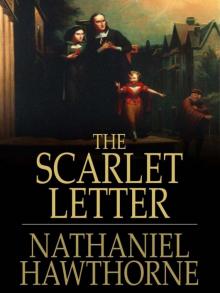 The Scarlet Letter
The Scarlet Letter Young Goodman Brown : By Nathaniel Hawthorne - Illustrated
Young Goodman Brown : By Nathaniel Hawthorne - Illustrated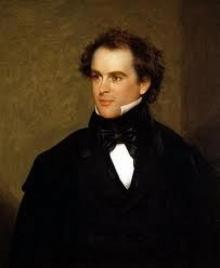 The Birthmark
The Birthmark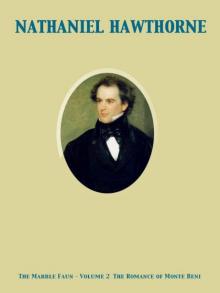 The Marble Faun; Or, The Romance of Monte Beni - Volume 1
The Marble Faun; Or, The Romance of Monte Beni - Volume 1 The Minister's Black Veil
The Minister's Black Veil The Great Stone Face, and Other Tales of the White Mountains
The Great Stone Face, and Other Tales of the White Mountains The House of the Seven Gables
The House of the Seven Gables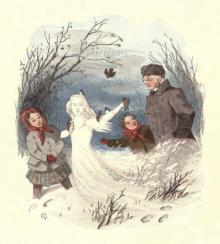 The Snow Image
The Snow Image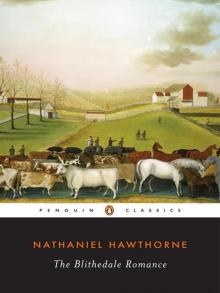 The Blithedale Romance
The Blithedale Romance Rappaccini's Daughter: By Nathaniel Hawthorne - Illustrated
Rappaccini's Daughter: By Nathaniel Hawthorne - Illustrated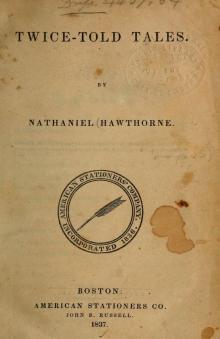 Twice-Told Tales
Twice-Told Tales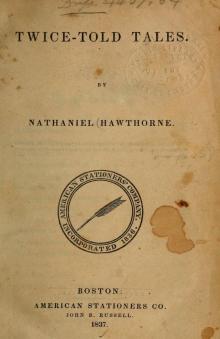 Twice Told Tales
Twice Told Tales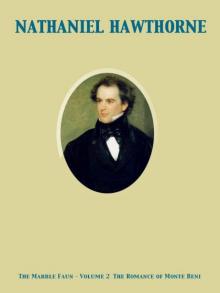 The Marble Faun; Or, The Romance of Monte Beni - Volume 2
The Marble Faun; Or, The Romance of Monte Beni - Volume 2_preview.jpg) Footprints on the Sea-Shore (From Twice Told Tales)
Footprints on the Sea-Shore (From Twice Told Tales)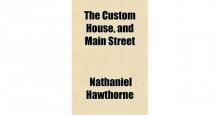 Main Street
Main Street_preview.jpg) The Seven Vagabonds (From Twice Told Tales)
The Seven Vagabonds (From Twice Told Tales) Fanshawe
Fanshawe Chippings with a Chisel
Chippings with a Chisel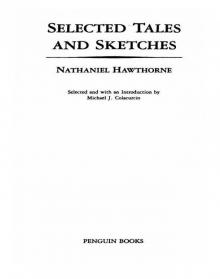 Selected Tales and Sketches
Selected Tales and Sketches Young Goodman Brown
Young Goodman Brown Roger Malvin's Burial
Roger Malvin's Burial The Prophetic Pictures
The Prophetic Pictures The Village Uncle
The Village Uncle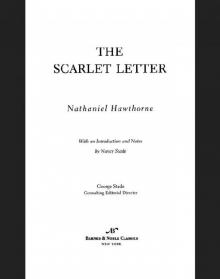 Scarlet Letter (Barnes & Noble Classics Series)
Scarlet Letter (Barnes & Noble Classics Series) The Procession of Life
The Procession of Life Drowne's Wooden Image
Drowne's Wooden Image Hawthorne's Short Stories
Hawthorne's Short Stories My Kinsman, Major Molineux
My Kinsman, Major Molineux Legends of the Province House
Legends of the Province House Foot-Prints on the Sea-Shore
Foot-Prints on the Sea-Shore The Haunted Quack
The Haunted Quack Tanglewood Tales
Tanglewood Tales The Seven Vagabonds
The Seven Vagabonds Mosses from an Old Manse, Volume 2
Mosses from an Old Manse, Volume 2 The Canterbury Pilgrims
The Canterbury Pilgrims Wakefield
Wakefield The Gray Champion
The Gray Champion The White Old Maid
The White Old Maid The Snow-Image: A Childish Miracle
The Snow-Image: A Childish Miracle The Gentle Boy
The Gentle Boy Mr. Higginbotham's Catastrophe
Mr. Higginbotham's Catastrophe![The Threefold Destiny: A Fairy Legend, by Ashley Allen Royce [pseud.] Read online](http://i1.bookreadfree.com/i2/04/10/the_threefold_destiny_a_fairy_legend_by_ashley_allen_royce_pseud__preview.jpg) The Threefold Destiny: A Fairy Legend, by Ashley Allen Royce [pseud.]
The Threefold Destiny: A Fairy Legend, by Ashley Allen Royce [pseud.] Lady Eleanore`s Mantle
Lady Eleanore`s Mantle The Great Carbuncle
The Great Carbuncle The Portable Hawthorne (Penguin Classics)
The Portable Hawthorne (Penguin Classics) True Stories from History and Biography
True Stories from History and Biography